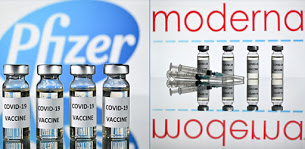Why do they require two doses? and other questions about the Pfizer and Moderna coronavirus vaccines, answered

Observer Research Foundation illustration
—–
By Baptist Health Blog and Kentucky Health News
The Covid-19 vaccines being distributed in the U.S. require two doses to achieve the effectiveness level of 95 percent recorded in clinical trials.
Multiple doses are standard for many vaccines. A vaccine works by exposing the body to a small part of the virus so that the immune system can learn to recognize it.
Think of the first dose as a “primer” to help your immune system create the antibodies that will fight the virus that causes COVID-19. Then, three or four weeks later, depending on which vaccine is used, a second dose “reminds” your immune system. By getting two doses, your immune system gets more opportunities to figure out how to counter a future infection.
The Pfizer Covid-19 vaccine went into use in the U.S. on Dec. 14. It requires two shots 21 days apart. The Moderna vaccine, which went into use the following week, requires two shots 28 days apart. Other vaccines in development would require only one dose, but are not likely to be approved anytime soon.
The Centers for Disease Control and Prevention recommends that health-care workers and residents and employees of long-term care facilities be the first to receive vaccinations, and Kentucky is following those recommendations. CVS and Walgreens are handling long-term-care vaccinations.
Is the vaccine safe? Pfizer ran tests that included more than 44,000 people. The Food and Drug Administration‘s analysis of the vaccine’s safety and effectiveness on people over the age of 16 has said that it found “no specific safety concerns” that would preclude the vaccine’s use. The Moderna vaccine ran tests that included 30,000 people.
- Fever
- Fatigue
- Headache
- Muscle pain
- Joint pain
- Injection site swelling
- Injection site redness
- Injection site pain
- Chills
- Feeling unwell
Vaccine side effects may happen in 10 to 15 percent of people. For most people, these side effects are mild and go away in a couple of days. During early use in the United Kingdom, at least two people experienced an allergic reaction to the Pfizer vaccine.